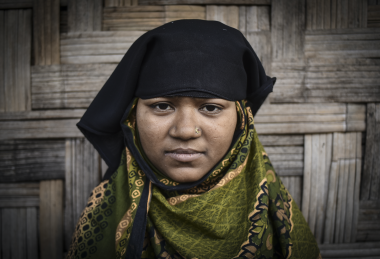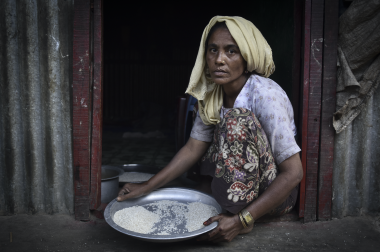By land, they wander for days through the jungle and mountains. By sea, they brave fishing boats in the Bay of Bengal’s rough waters. Fleeing the embers of their villages – razed by Myanmar’s military genocide – the Rohingya people enter crowded camps full of uncertainty. Women for Women International’s Conflict Response Fund aims to give them back some stability.
Since August 2017, Myanmar has forced more than 800,000 Rohingya refugees, mostly women and children, into makeshift communities at the border of neighboring Bangladesh. While waiting for either nation to decide the fate of the largest refugee camp in the world, the Rohingya people must rebuild their lives so no matter where they live, their society can get back on its feet.
Most crisis efforts focus on traditional life-saving measures, often overlooking the specific needs of women. Our Conflict Response Fund allows us to prepare gender-specific support and resources for when women face unexpected crises and immediately respond to violations of their rights.
According to a UN Women report, almost every Rohingya refugee woman and girl has either survived or witnessed violence, much of it sexual. The camps offer little privacy and electricity, leaving them exposed and unsafe, especially at night. Along with the threat of assault, some may be kidnapped and sold into sex trafficking by other Rohingya while authorities turn a blind eye – or even sell themselves for food.
Yet these women and girls are the future of their community. The crisis threatens to leave a generation of Rohingya lost without food, clothing, shelter and the educational opportunities that will help develop their communities. Without investment in their ability to sustain their families and their society, the Rohingya will continue to struggle to survive instead of recover.
Through the Conflict Response Fund, we partnered with local NGO Research, Training and Management (RTM) International to provide training for these women and girls with vocational skills and income to support their families, start new ones and rebuild their communities – wherever they are.
The fund expanded and accelerated RTM International’s work by integrating trainings into the NGO’s existing health centers. Young women and girls received training in useful skills that allow women to start small businesses or find paid work.
Having a small enterprise or work that can be done inside or outside the home offers young women a chance to contribute to their family’s income. Rohingya youth believe that learning business and vocational skills will open opportunities for future jobs, and they can fill paid volunteer positions at RTM and other donor-funded projects.
Despite these qualifications, women and girls face an uphill struggle within Rohingya society. Social norms and traditional practices limit women’s participation and leadership in society, access to education and livelihood opportunities. Traditionally, Rohingya women’s work is in the home and unpaid. Leaving the home to work in public is perceived as shameful – even by most other women.
Young women and girls can't reach the height of their potential on their own: We need to bring all kinds of partners together to help clear the barriers in their path.
Together with 100 leaders from the refugee communities and government officials from Bangladesh – where a policy already exists to develop skills for youth nationwide – we hosted events to encourage people to see young women as drivers of change.
Through “community mobilization meetings” with Rohingya youth, we educated people on why ensuring women and girls have job skills is key to rebuilding Rohingya communities – and where and when they can sign up to learn.
Local partners need help transforming the Rohingya’s uncertain present into a more confident, resilient future: A global crisis calls for global partners.
We ask you to stand with the Rohingya refugee women. Pledge your support for these women and girls to build a better future for their families, their communities and themselves. We hope you will join us.
Learn more about our work with Rohingya women and girls remaining in Myanmar.
Post updated March 2022


